|
|
|
Sort Order |
|
|
|
Items / Page
|
|
|
|
|
|
|
| Srl | Item |
| 1 |
ID:
093668
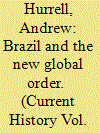

|
|
|
|
|
| Publication |
2010.
|
| Summary/Abstract |
Brazilian foreign policy under Lula has emphasized not only traditional multilateralism but also membership in the new formal and informal groupings that have emerged at the heart of a new world order.
|
|
|
|
|
|
|
|
|
|
|
|
|
|
|
|
| 2 |
ID:
112800


|
|
|
|
|
| Publication |
2012.
|
| Summary/Abstract |
There is a widespread perception that power is shifting in global politics and that emerging powers are assuming a more prominent, active and important role. This article examines the role of emerging powers such as China, India, Brazil and South Africa (BASIC) in climate change politics and the extent to which their rise makes the already difficult problem of climate change still more intractable-due to their rapid economic development, growing power-political ambitions, rising greenhouse gas emissions and apparent unwillingness to accept global environmental 'responsibility'. By reviewing the developments in global climate politics between the 1992 Rio Earth Summit and Rio+20, this article unsettles the image of a clear shift in power, stressing instead the complexity of the changes that have taken place at the level of international bargaining as well as at the domestic and transnational levels. Within this picture, it is important not to overestimate the shifts in power that have taken place, or to underplay the continued relevance of understanding climate change within the North-South frame. Emerging powers will certainly remain at the top table of climate change negotiations, but their capacity actively to shape the agenda has been limited and has, in some respects, declined. Even though emerging powers have initiated and offered greater action on climate change, both internationally and domestically, they have been unable to compel the industrialized world to take more serious action on this issue, or to stop them from unpicking several of the key elements and understandings of the original Rio deal. At the same time, developing world coalitions on climate change have also fragmented, raising questions about the continued potency of the 'global South' in future climate politics.
|
|
|
|
|
|
|
|
|
|
|
|
|
|
|
|
| 3 |
ID:
075846
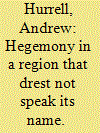

|
|
|
| 4 |
ID:
068629
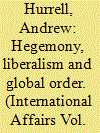

|
|
|
| 5 |
ID:
001735


|
|
|
|
|
| Publication |
Oxford, University press, 1999.
|
| Description |
xx,353p.
|
| Standard Number |
0198295677
|
|
|
|
|
|
|
|
|
|
|
|
Copies: C:1/I:0,R:0,Q:0
Circulation
| Accession# | Call# | Current Location | Status | Policy | Location |
| 041370 | 327.1/HUR 041370 | Main | On Shelf | General | |
|
|
|
|
| 6 |
ID:
141225
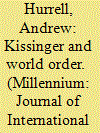

|
|
|
|
|
| Summary/Abstract |
Kissinger’s World Order: Reflections on the Character of Nations and the Course of History provides a powerful restatement of many of themes that have run through Kissinger’s previous writings, his commentary on international affairs, and his own view of the practice of own diplomacy. The book displays Kissinger’s capacity for grand synthesis and his ability to weave together a vast range of material into a coherent overall pattern. It is surely correct in pressing the case for taking the return of geopolitics seriously and for recognising the importance of different ways of seeing the world and of interpreting world order. But it is deeply flawed in the manner in which the themes of power and values are treated and in the moral and political lessons that are drawn from the analysis.
|
|
|
|
|
|
|
|
|
|
|
|
|
|
|
|
| 7 |
ID:
071096
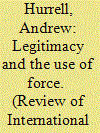

|
|
|
| 8 |
ID:
076522
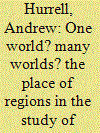

|
|
|
|
|
| Publication |
2007.
|
| Summary/Abstract |
This article is a revised version of the 2006 Martin Wight Memorial Lecture and examines the placeof regional states-systems or regional international societies within understandings of contemporary international society as whole. It addresses the relationship between the one world and the many worlds-on one side, the one world of globalizing capitalism, of global security dynamics, of a global political system that, for many, revolves a single hegemonic power, of global institutions and global governance, and of the drive to develop and embed a global cosmopolitan ethic; and, on the other side, the extent to which regions and the regional level of practice and of analysis havebecome more firmly established as important elements of the architecture of world politics; and the extent to which a multiregional system of international relations may be emerging. The first section considers explanations of the place of regionalism in contemporary international society and the various ways in which the one world aff ects the many. The second section deals with how regionalism might best be studied. The final section analyses four ways in which regionalism may contribute to international order and global governance
|
|
|
|
|
|
|
|
|
|
|
|
|
|
|
|
| 9 |
ID:
065895
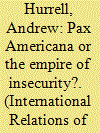

|
|
|
| 10 |
ID:
049313
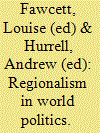

|
|
|
|
|
| Publication |
Oxford, Oxford University Press, 1995.
|
| Description |
xiii, 342p.
|
| Standard Number |
019828067X
|
|
|
|
|
|
|
|
|
|
|
|
Copies: C:1/I:0,R:0,Q:0
Circulation
| Accession# | Call# | Current Location | Status | Policy | Location |
| 041800 | 320.549/FAW 041800 | Main | On Shelf | General | |
|
|
|
|
| 11 |
ID:
103260


|
|
|
|
|
| Publication |
2011.
|
| Summary/Abstract |
This article takes the example of global governance in order to reflect on the problematic relationship between theory and practice and on the gap that exists between the academic and policy worlds. That there is a gap between the two worlds is clear. Some insist on the benefits to be gained from trying to bridge the gap, highlighting the contribution that theoretical inquiry can make to the policy world and the responsibility of academics to contribute towards resolving policy challenges. Others argue for the continued importance of a division of labour, stressing that the logic of theoretical enquiry demands analytical and critical distance from power and politics. This article does not examine either of these extreme positions but instead explores the dangers of the middle road. For academics, insufficient awareness of the problematic ways in which theory and practice are inextricably interwoven makes it more likely that they will fall hostage to the politics and parochial prejudices of both time and place. For policymakers and for those who teach public policy, the danger lies in seeking the authority and legitimacy of academic work that purportedly embodies objectivity and detachment but that in fact merely translates the prejudices and preoccupations of the policy world back into a different idiom. An unreflective and uncritical attitude to the relationship between theory and practice can leave the academic study of International Relations in the worst of all possible worlds.
|
|
|
|
|
|
|
|
|
|
|
|
|
|
|
|
|
|
|
|
|